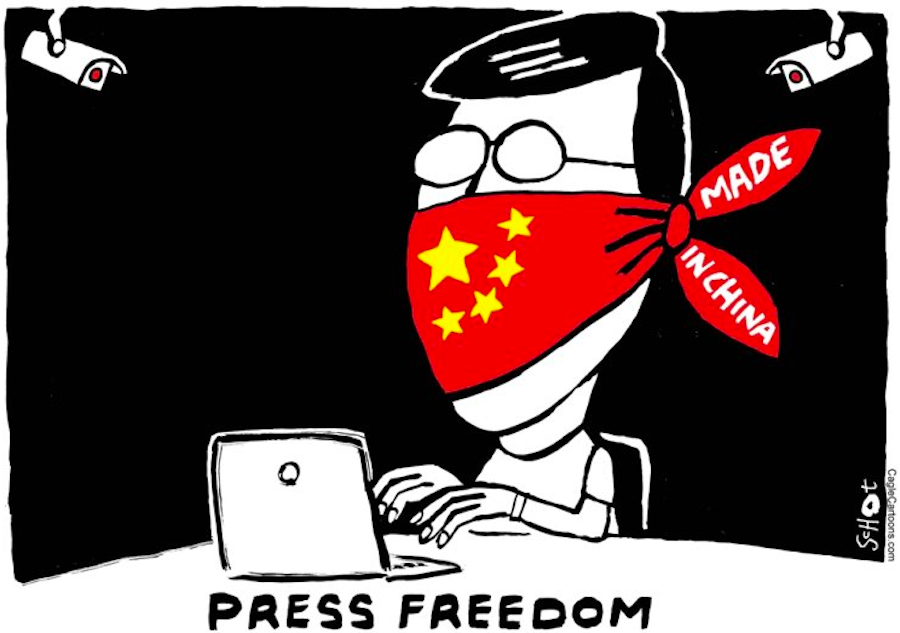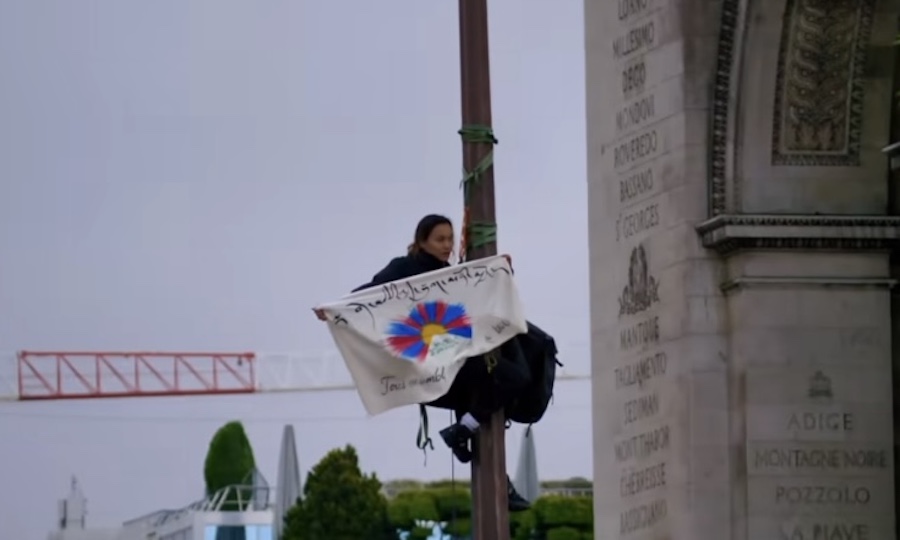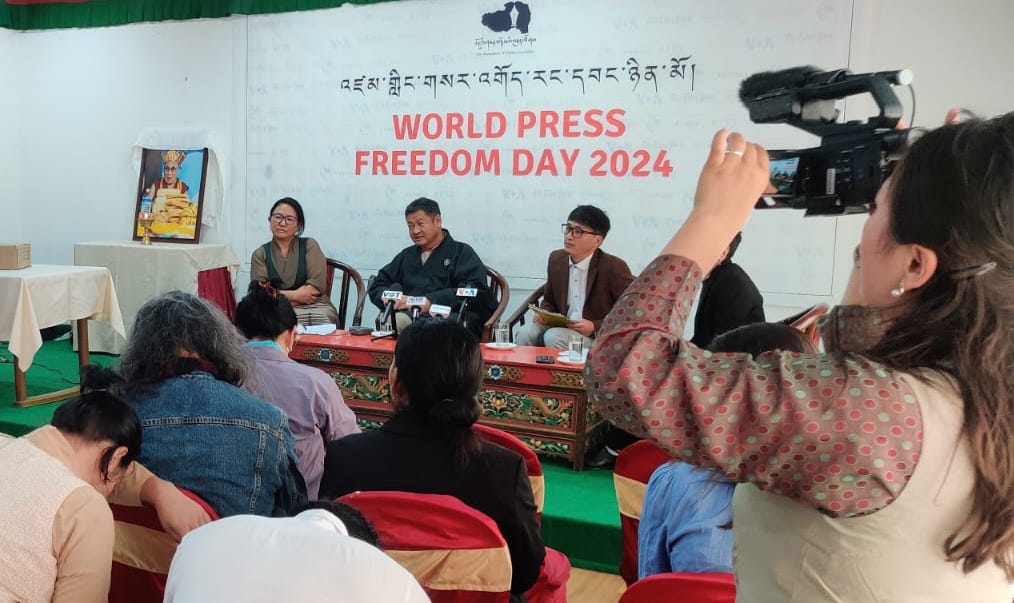By Calum MacLeod,
 LHASA, Tibet: From behind bars, the young man fidgeted. His eyes flickered over to a policeman standing nearby as he debated how to answer a very sensitive question.
LHASA, Tibet: From behind bars, the young man fidgeted. His eyes flickered over to a policeman standing nearby as he debated how to answer a very sensitive question.
Was the Dalai Lama responsible for the recent riots in Tibet? A visiting group of journalists had posed the question. Now, Dang Zhen, an ethnic Tibetan driver who was detained for his alleged role in the violence, had to decide whether to parrot the Chinese government’s official line that, yes, Tibet’s spiritual leader was to blame.
“It is hard to say my opinion,” Dang said nervously, stalling for time. “He is my religious leader.”
That minor act of defiance and other scenes throughout Tibet’s capital on Thursday, including an emotional protest by monks that made headlines worldwide, undermined the Chinese government’s claim that life in Lhasa has returned to normal.
A group of roughly 25 foreign journalists, including a reporter from USA TODAY, was allowed into Tibet for a rare, two-day trip under the strict supervision of Chinese government officials. China was eager to show the world that, with just four months to go before the Beijing Olympics, it had ended the unrest without resorting to the massive use of force that has drawn criticism in the past.
The crackdown has renewed long-standing concerns over the Communist government’s human rights record and treatment of dissidents. President Bush called Chinese President Hu Jintao this week to express concern about Tibet. French President Nicolas Sarkozy has suggested boycotting the Olympic opening ceremony to show the world’s displeasure with China’s actions.
Chinese officials led the visiting journalists on a tightly scripted tour of Lhasa, where paramilitary police in riot gear marched down the street next to newly hung red banners urging national unity, peace and harmony. No new violence has been reported in several days, and several alleged rioters in custody, including Dang, confessed to reporters they were sorry for their crimes.
However, interviews with other residents of Tibet — some of which took place under the supervision of Chinese officials, and others with none present — suggested that tensions linger among the province’s residents, and that turmoil could return at any time.
Shopkeeper Mahai Jizhe, 38, says she has been living with her two children in Lhasa’s city aid center since rioters attacked her shop and home.
“I don’t dare go back to my shop,” she said. “I worry (the attack) may happen again.”
Residents cited a variety of causes for the riots. Some blamed tensions between native Tibetans and those from China’s ethnic majority, the Han, who have moved to Lhasa in massive numbers in the past two years and now dominate the province’s urban economy.
Others attribute the violence to the pro-independence movement that has intermittently shaken Tibet since Chinese troops invaded more than a half-century ago. The Chinese government says the Dalai Lama, who is in exile in India and prohibited from returning to Tibet, orchestrated the riots to “sabotage” the Olympics.
Tang Qinyan was among those who agreed with the government’s interpretation of events. Standing in front of his charred Yishion clothes shop, Tang said, “Relations between ethnic groups are very harmonious.” His store is now a flower-filled shrine.
Four ethnic Chinese saleswomen and one Tibetan were killed there in an arson attack on March 14, Tang said. The effect on the corpses “was like roast duck.”
Living separate lives
Many ethnic Chinese say they moved to Tibet — where the culture, religion and language are different from the rest of the country — for economic reasons. Salaries are often higher here, in part because of a lack of skilled labor. About half of ethnic Tibetans are estimated to be illiterate.
Zhang Qingjun, a former farmer from central China who moved to Tibet three years ago to drive a taxi, said he can earn about a third more than back home. Nevertheless, the ethnic tensions behind the riots have convinced his wife that they should move back.
“I was scared to death,” Zhang said. “I saw Tibetans burning cars on the streets, so I drove my taxi straight home, and my wife and I stayed there for two days.”
Zhang says he has no Tibetan friends, and says the two communities often live separate lives.
Some of the violence also targeted members of the Hui minority, who are ethnically Chinese but distinct because of their Muslim religion. Many of their businesses, and the biggest mosque in Lhasa, were targeted by the rioters.
Mahai Jizhe, the shopkeeper who refuses to return home, said her religion made her a target. The rioters “shouted at me, ‘What are you Hui and Han doing here in Lhasa? You make money and eat your fill, but you should be making money in your own home!’ ”
Mahai dreams of returning to her home province of Gansu, but after losing eight years of savings in the unrest, she believes that day is more distant than ever.
Roots of ethnic rivalries
Some Tibetans admit that ethnic rivalries played a part in their decision to protest. Dang Zhen, the rioter who refused to denounce the Dalai Lama before the journalists, admitted that he kicked in doors of Hui businesses.
“I was not paid properly when I once worked for some Hui people, and they gave me urine to drink as water,” he said.
However, other Tibetans say the ethnic tension has clear roots in religion and politics — a result of the Chinese government’s constant vitriolic attacks on the Dalai Lama. The protests began on the 49th anniversary of Tibet’s failed uprising against Chinese rule in 1959.
“Tibetan people, and especially the monks, were angry that the Dalai Lama cannot come back to Tibet,” said retired farmer Luo Gar. “The Chinese will not let him come back, and I don’t dare have even one picture of him in my home.”
“Violence is bad, but I can understand why people were so angry,” said Sina Zhuoma, a shop assistant. The recent immigration of other ethnic groups has made Tibetans feel like foreigners in their own land, she said. “If I enter a shop and speak Tibetan, they shout at me to speak Chinese. I tell them they should learn Tibetan, as they are living in Tibet.
“We can get along — I have Han (ethnic Chinese) friends — but there are many Han who make Tibetans angry,” Sina said.
Others agreed that the upcoming Olympic Games, and the global spotlight that accompanies them, could embolden more protesters in the months ahead.









